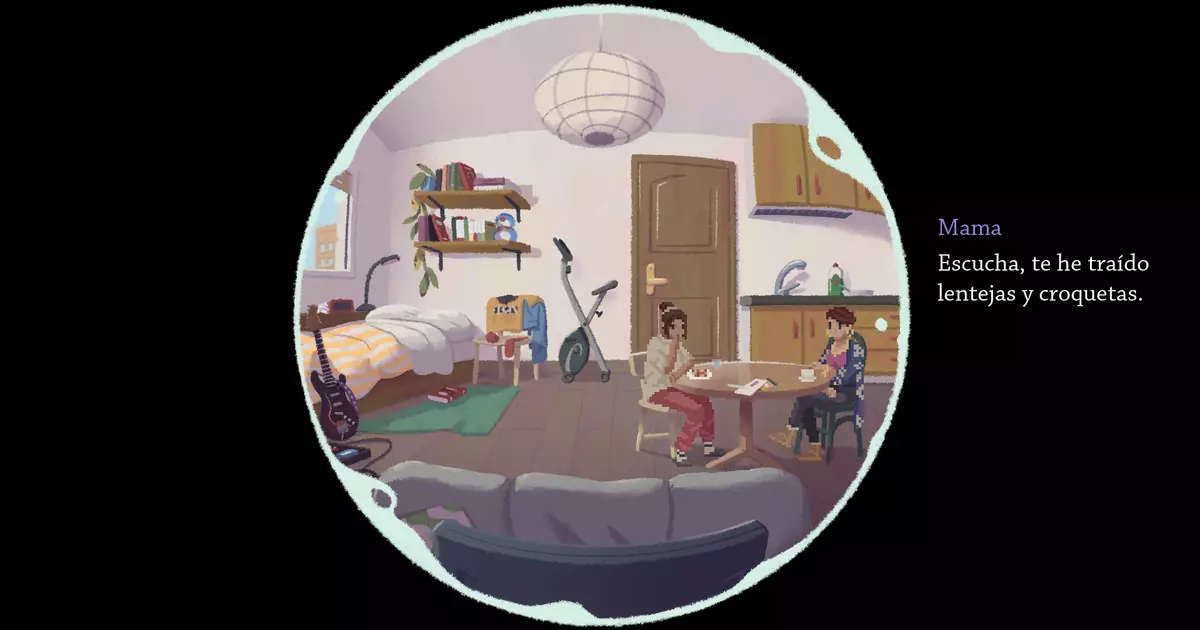In a world that often equates productivity with worth, the experience of burnout can feel isolating and overwhelming. “Vendrán Las Aves,” translated as “The Birds Will Come,” embodies the essence of healing and recovery from burnout through its poignant simplicity. Developed by the Valencia-based team of Francisco Riolobos, Chuso Montero, and Deconstructeam, known for their work on “The Red String Club” and “The Cosmic Wheel Sisterhood,” this game serves as an innovative exploration of self-care and emotional rebuilding. Built as part of a game jam, it is accessible in both Spanish and English, and, strikingly, it is available for free on Itch.io.
The game invites players into the intimate space of a one-room apartment, all framed within a snowglobe-like perspective. Here lives an unnamed protagonist who has recently exited a strenuous job, grappling with the mental fatigue that comes with such transitions. The gift of a guitar, bought in a moment of impulsive hope, stands as a symbol of potential creativity and self-expression, yet the character remains paralyzed by exhaustion. The player’s mission centers around resource allocation: each day, a limited pool of energy points must be wisely distributed across various tasks—including eating, watching television, and tackling household chores—to restore enough vitality for the character to eventually embrace their new musical venture.
This gameplay mechanic mirrors the often precarious balance required in real life, particularly when facing the weariness of burnout. On certain days, players may find themselves choosing the more comforting, but less constructive options, such as ordering in and mindlessly scrolling through social media, a reflection of genuine human experience. However, the underlying message is that tomorrow presents another chance, encapsulating a sense of hope and renewal.
An underlying theme prevalent throughout “Vendrán Las Aves” is the significance of community and support networks in recovery. Players soon realize that interactions with friends and family, depicted through encounters such as the arrival of a nurturing parent with a meal, can ease daily burdens, leaving more energy for self-improvement activities like reading or exercising. This aspect of the game subtly emphasizes the need to seek and accept help from others, challenging the misconception that recovery is solely an individual endeavor.
It’s essential to note that the developers navigate tricky waters when linking burnout with the broader conversation of workplace environments and societal expectations. The game implies a critique of the structural issues contributing to burnout while also respecting the protagonist’s intrinsic love for creativity, presenting a multifaceted view of mental health.
For many players, “Vendrán Las Aves” can resonate deeply, prompting reflections on personal experiences with burnout and mental exhaustion. The character’s journey resonates with the combination of despair and restlessness, as well as the recognition of one’s limitations amidst a relentless world outside their door. By portraying this experience through a point-based system, the developers offer a unique lens—a method of quantifying and simplifying the dilemmas faced during periods when motivation feels utterly elusive.
However, it’s crucial to approach the game with the understanding that it is not a substitute for professional mental health resources. The game delicately weaves the personal narrative of burnout but should be seen as a catalyst for self-reflection rather than a definitive guide to mental wellness.
In discussing “Vendrán Las Aves,” it becomes apparent that the comparison to a “tamagotchi” style of gameplay could invite further interrogation. While it evokes nostalgia, it also raises questions regarding the use of virtual companionship in mental health recovery—especially when such interactions may lack the depth and empathy found in real-life connections. This thought leads to reflections on other significant works, such as Zoe Quinn’s “Depression Quest,” which similarly address themes of mental health in interactive formats.
Ultimately, “Vendrán Las Aves” stands as a compelling invitation to engage with one’s own emotional landscape while advocating for the kind of compassionate practices that facilitate healing. Through its innovative approach, this game not only entertains but encourages players to discover paths to resilience, serving as a gentle reminder that renewal is always within reach.


Leave a Reply
You must be logged in to post a comment.